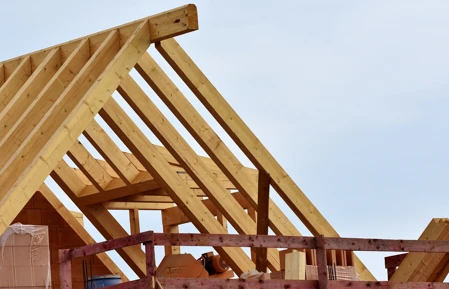Written by: Mobeen Akram - National New Homes Account Director
There’s definitely something to be said for investing in a new build house, from the ease of maintenance, high-quality building work, and even the sense of community.
However, while there are plenty of benefits to new build homes, you do have to take into account that they aren’t for everyone.
Older properties have their charms, including unique and period features, and the ability to renovate to make the space your own. On the other hand, new builds can have more room, are more energy efficient, and are often close to cityside amenities.
With that in mind, new builds are a great option for a lot of people. Let’s break down some of the pros and cons to help you determine whether you should buy a new build.

What are the benefits of a new build house?
Make the space your own
If you purchase a new build on a development before it’s complete, you may have the option of personalising features, as well as adding any finishing touches - all without having to put in the DIY work!
This could be anything from choosing carpets, paint colours, tiles, and even your garden details. You'll also be able to choose from a variety of standard features and include optional extras, from additional lighting to built-in wardrobes.
You have the potential to make a considerable saving through these personalised touches, as developers can purchase these materials in bulk. This means that your house will be ready when you move in.
If you’re renovating an existing home, you’d likely need to work with traders and source your own materials, so do factor this into your decision.
Developer warranties and incentives
Developers are really on board with helping you love your home, offering incentives for first time buyers and current homeowners alike. They often provide buying schemes like Stamp Duty covers, deposit contributions, and easy move schemes, as well as access to incentives such as part exchange, and Own New (a reduced interest rate incentive scheme).
They’re also popular options for Shared Ownership and developers will sometimes even cover solicitor fees or removals costs. All new builds also come with a 10-year warranty, which should eliminate any concerns you have about the longevity of your build.
There are other schemes, such as Shared Ownership, that helps prospective and current homeowners afford new build properties. You may also find that a Lifetime ISA (LISA) offers benefits in terms of topping up your deposit.
Our expert advisers can talk you through the mortgage options, helping you decide which is the most suitable option.
Renovating can be expensive
It’s no secret that renovations can add up. If your home is in desperate need of some work, or you’re thinking of purchasing an older property, it’s worth noting that the average costs for a renovation (for a three bedroom home) is £76,0001. Those are some pretty significant differences, so it’s important to note that the biggest number there is for a total house refurbishment. We’re talking replacement windows, new kitchens, rewiring, fresh insulation, new heating and gas, the works.
Now, there are ways to fund a renovation using the equity in your home. If this is something you’re interested in, check out our remortgaging to renovate article. However, if these costs seem steep, consider asking yourself “should I buy a new build house?” for the same benefits.
New builds adhere to strict building and energy efficiency regulations, so you can ensure they’re built to a high standard. They also come with ‘snagging clauses’, so any issues related to the quality of the building work after you move in must be fixed by the contractor.
Highly energy efficient
Did you know that 85% of new build homes in England and Wales have an EPC rating of A or B?2 New builds are constructed with the future in mind, and as energy costs increase, so will the desire to live in a home that’s efficient straight out of the box. Furthermore, energy efficient houses could be up to 55% cheaper to run2, and reduce your bills by £2,200 each year.2
Modern and spacious
Modern living is its own beast these days, with more people working from home, looking for flexible living spaces, and interested in full tech integration. New build homes are typically designed to be more open-plan, with living areas that can be adapted to the owner’s preferences. They will also usually have more evenly-sized bedrooms, more than a single bathroom, and pre-built storage.
It may surprise you to know that on average, new builds have more space than existing properties. For a house, a new build has an average floorspace of 109.34m2 compared to 101.74m2 for existing properties3. This may be surprising for some, as new builds have had a reputation for being smaller than your average existing home.

Are there downsides to buying a new build?
At the end of the day, there are some factors you’ll need to take into account when searching for your dream home. New builds might not be suitable for everyone, and the primary obstacle could be cost. New builds can be more expensive3 than your average home - after all, you’re getting a lot of bang for your buck.
Secondly, if there are delays in construction, your move date could be pushed out. Developers have a short stop and a long stop date, which essentially are two deadlines. They are legally bound to finish development by the long stop date, but the main concern here is your mortgage offer could expire before the build has completed. This is why it’s recommended to work with a specialist new build adviser, who will be experienced in dealing with these types of situations.
Finally, lenders can be a bit stricter with new builds than existing homes, particularly the loan-to-value (LTV). This means you may need a bigger deposit than you would need for an existing property.
Should I buy a new build?
While we can’t give you a definitive answer, we hope this guide has helped demystify the benefits of buying a new build. As we said earlier, everyone’s circumstances are different, but weighing up the pros and cons outlined above should give you more of an indication as to whether it’s a suitable option for you.
If you want to explore the idea of buying a new build house, be sure to search online for new build houses in areas you’d like to live in, visiting show homes to get an idea for current styles and locations. This is also an ideal opportunity to enquire about any incentives or schemes offered by developers you may be able to take advantage of.
If you feel like a new build is the right choice for you, get in touch with one of our expert advisers today to chat through your mortgage options.
Sources and references:
1 Checkatrade, 2024
2 Watt a Save, 2023
3 Compare My Move, 2024
Important information
Your home may be repossessed if you do not keep up repayments on your mortgage.
There may be a fee for mortgage advice. The actual amount you pay will depend on your circumstances. The fee is up to 1% but a typical fee is 0.3% of the amount borrowed.




